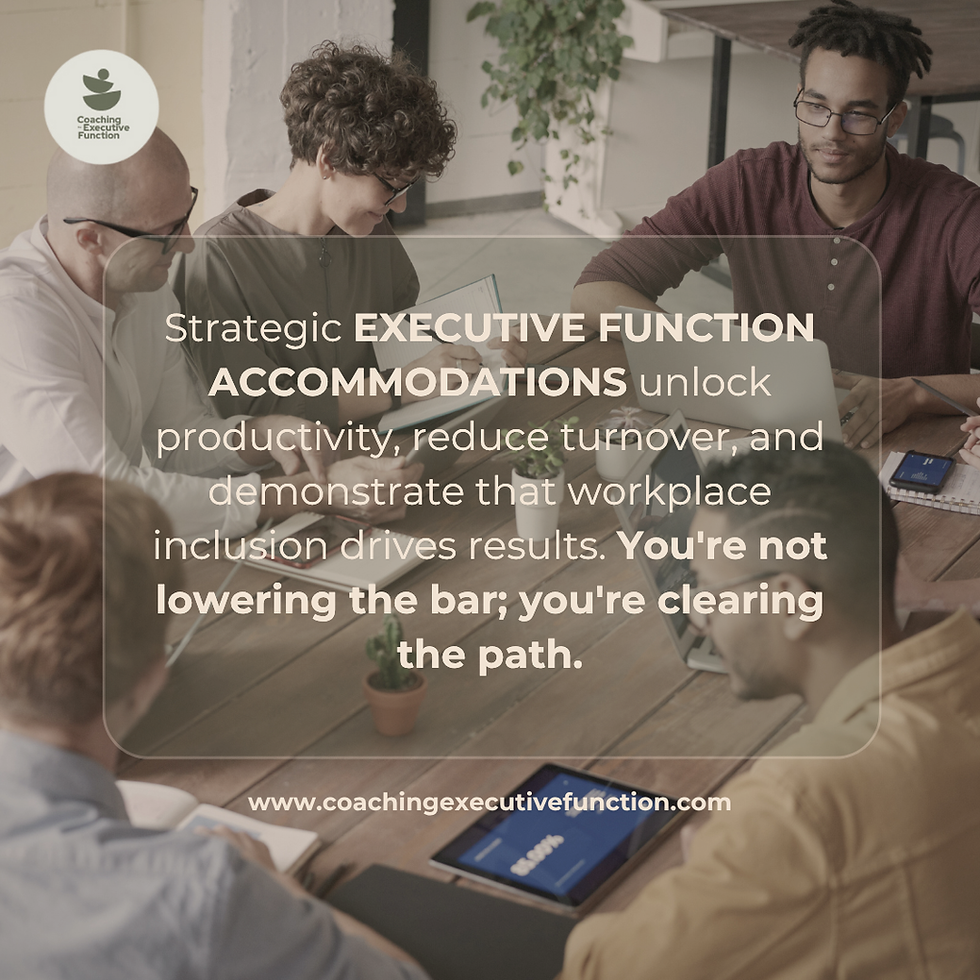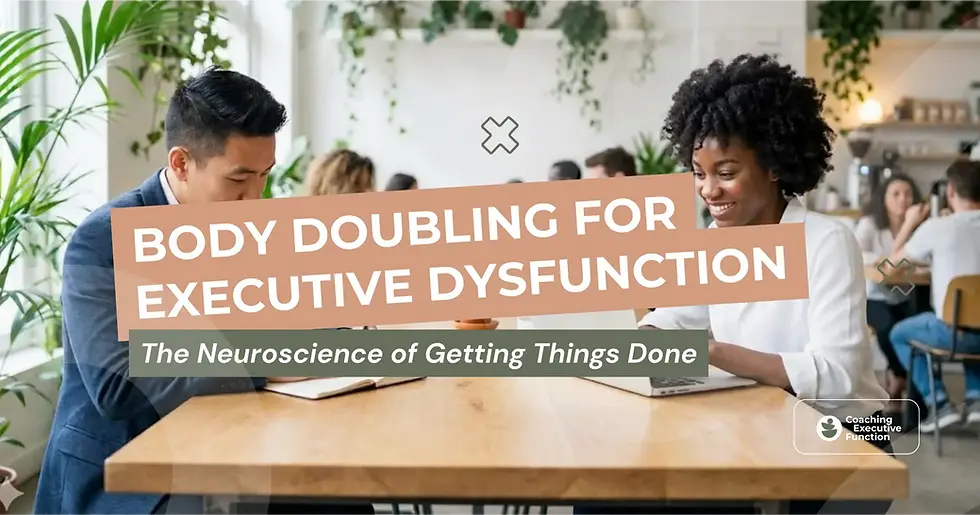Boosting Performance with Executive Function Accommodations
- Jacquelyn Harper MS, OTR/L, ADHD-RSP

- Jul 17, 2025
- 4 min read
Elevate Your Team: Executive Function Accommodations in the Workplace.

Organizations often worry that supporting executive function (EF) challenges common in ADHD, anxiety, and even general modern overload might mean compromising output. However, smart executive function accommodations actually preserve or even boost performance. This is because they remove cognitive roadblocks that prevent talented individuals from doing their best work.
The approach to executive function accommodations can vary significantly within organizations, ranging from mere compliance to a deeply embedded cultural practice. Understanding this spectrum is crucial for genuinely supporting every brain on your team while keeping performance standards high.
Approach | What It Looks Like | Impact on Standards |
Compliance-Only | Minimal ADA paperwork, “check the box” adjustments | Risk of resentment; standards drift when supports are unclear |
Culture-Driven | Open conversation, universal design of workflows, shared EF skill-building | Standards upheld because expectations are explicit and supports are built in |
It's time to move beyond isolated fixes and cultivate a culture where executive function accommodations are an integral part of how work gets done. This approach supports workplace inclusion and helps uphold neurodiversity and performance standards. To truly achieve this, let's delve into the core principles that guide effective accommodation and accountability.
Core Principles for Executive Function Accommodations
To successfully implement executive function accommodations while maintaining accountability, consider these core principles:
Externalize Critical Information: Rely on systems, not memory. Tools like shared Kanban boards, written Standard Operating Procedures (SOPs), and automated reminders make expectations visible and measurable.
Clarify the "What," Flex the "How": Maintain the non-negotiable quality of deliverables while allowing flexibility in work style (e.g., using noise-canceling headphones, or having flexible hours for deep work).
Embed Milestone Visibility: Break down large projects into checkpoints with objective criteria. This keeps progress transparent and allows for early identification of slipping standards.

Maximizing Performance: Practical Executive Function Accommodations That Maintain Quality.
Ready to implement changes that make a real difference without compromising excellence? Here are practical executive function accommodations designed to support your team's best work, ensuring quality remains paramount.
Challenge | Accommodation | How Standards Stay Intact |
Working Memory Drain | Provide checklists, meeting recaps, and version-controlled docs | Everyone completes the same tasks—now with fewer errors |
Time-Blindness | Use visual timers or calendar nudges | Deadlines remain; just add tools that boost on-time delivery |
Task-Switch Fatigue | Offer 90-minute focus blocks, limit meeting clutter | Deep work improves accuracy; output quality rises |
Impulse-Driven Replies | Encourage a “Reflective Pause” (10-second silent count) | Communication remains professional, reducing rework from conflict |
Manager's Playbook: Applying Executive Function Accommodations
Managers play a crucial role in implementing executive function accommodations effectively. Here’s how to support your team while upholding high standards:
Contract for Excellence, Not “Effort.”: Instead of focusing on the amount of effort put in, define what a "finished" product looks like with objective criteria. For example, specify that a document must have correct formatting, accurate data, and a client-ready tone. This ensures clarity on expectations and measurable outcomes.
Coach, Don’t Cushion.: When an employee faces a challenge, avoid simply excusing it. Instead of saying, "Don't worry about that," empower them by providing tools or strategies that will help them "nail it". This fosters independence and skill development, reinforcing productivity strategies for teams.
Document Agreements.: Formalize executive function accommodations through written plans. These plans, combined with clear metrics, ensure fairness for all team members and provide legal clarity. This helps maintain consistency and accountability.
Review Data, Not Drama.: Shift from relying on anecdotal complaints or personal observations to tracking performance using objective data. Utilize dashboards to monitor deliverables, allowing for a fact-based assessment of progress and the impact of executive function accommodations.
Organization-Wide Practices That Boost Everyone’s Executive Function.
These organization-wide practices boost everyone's executive function, fostering stronger productivity strategies for teams:
Universal Design for Meetings: Agenda sent 24 hours in advance, timed sections, end-of-call action recap.
Two-Tier Deadlines: Internal draft then client-ready version. Buffer preserves quality without heroics.
Process Spotlights: Monthly team stand-up where employees share EF hacks—builds a shared toolbox.
Skill Micro-Lessons: Push 2-minute videos on task chunking, digital declutter, or stress resets via Slack.
Measuring Success: Executive Function Accommodations in Action.
When implementing executive function accommodations, track these key performance indicators (KPIs) to see the impact:
KPI | Pre-Accommodation | Post-Accommodation Goal |
On-Time Delivery Rate | 78 % | ≥ 90 % |
Error Revisions per Project | 3.7 | < 2 |
Employee Self-Report: “I Have the Tools to Meet Expectations” | 62 % | ≥ 85 % |
Customer Satisfaction Score | 8.1 / 10 | ≥ 8.5 / 10 |
If these numbers improve, it proves that accommodations strengthen not soften standards. This is key for ADHD at work and supporting overall neurodiversity and performance standards.
Action Steps for Leaders: Elevating Performance with Executive Function Accommodations.
Leaders can take these steps to integrate executive function accommodations effectively:
Audit Cognitive Load Hotspots: Identify processes where memory-heavy or distraction-prone tasks are lurking.
Pilot One Universal Accommodation: Try shared checklists or focus blocks for 30 days and measure their impact.
Train Managers in EF Coaching Skills: Early conversations can prevent small slips from becoming significant gaps.
Iterate and Scale: Use KPI data to refine and then roll out successful practices company-wide.

👉 Book a consultation or request customized workshops to equip your organization with evidence-based strategies that honor both neurodiversity and performance excellence.





Comments